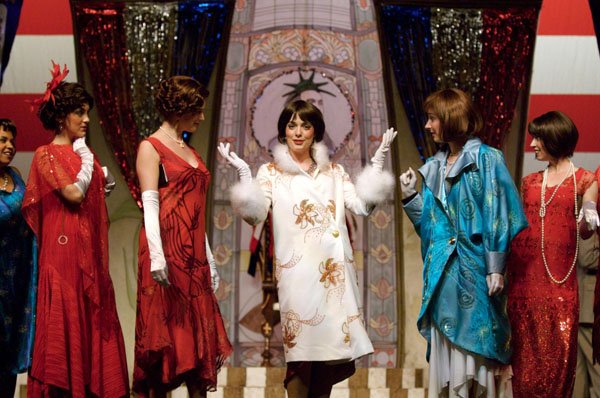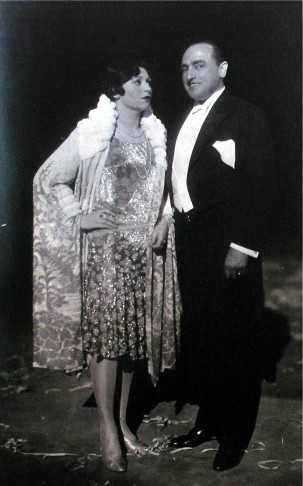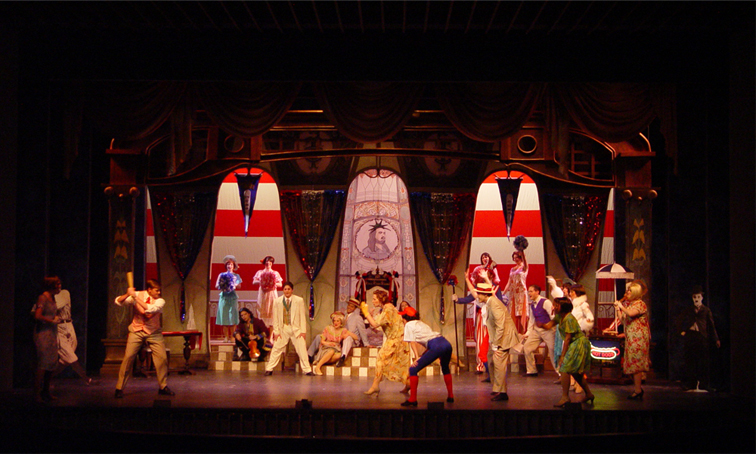Michael H. Hardern
Operetta Research Center
5 July, 2015
As everyone knows, the Ohio Light Opera is one of the prime performance venues for lesser known works of Emmerich Kalman. With the current festival in full swing right now, and no Kalman on the program in 2015, Michael Miller of the Operetta Archives in Los Angeles (a board member at OLO) has released a DVD of Die Herzogin von Chicago, filmed in the small college theater of Wooster. It’s a true labor of love!

The DVD cover of “The Duchess of Chicago,” from Ohio Light Opera.
Kalman’s 1928 Charleston-operetta is the most “American” score the composer ever wrote, half of the numbers are pure Broadway – and the story is, in fact, about an American zillionaire’s daughter who travels to old-fashioned Europe and stirs up life in an old-fashioned palace in Sylavria. (That’s a mix of Transylvania and the name Sylva Varescu, Kalman’s heroine in Csardasfürstin.) The other half of the score is filled with “traditional” operetta music, i.e. Viennese waltzes and fiery czardas. In the end, the boundaries are torn down, and the finale is a fusion of both worlds – Vienna, Broadway and Hollywood. Till that happens, a battle of the sexes and styles is on.
After Die Herzogin von Chicago was “rediscovered” by Michael Haas as part of the Decca “Entartete Musik” series, back in the 1990s, there have been many stage productions. But so far only the Viennese Volksoper version found its way onto a very unfortunate DVD. Unfortunate, because the story is more or less completely fucked up in this production (with scenes changed around ad lib); and what’s worse, the music is sung by typical “operetta singers” of today who have no idea of how Broadway oriented numbers should be presented. It’s mostly embarrassing to listen to. The only truly great moment on the entire DVD is a cartoon that was shown to illustrate to cowboys and Indians number “Rose der Prärie.” (If only the whole staging had been as witty and colorful as this scene!)

“Duchess of Chicago,” scene from the 2007 staging at Ohio Light Opera. (Photo: OLO)
So, here now is another DVD, filmed at the Ohio Light Opera in 2007 of an English sung production. You would imagine that the young American singers would know how to properly present those American jazz numbers. Surprisingly, they don’t. With the exception of the vivacious Jacob Allen as Mr. Bondy, all lead actors lack panache and that certain Broadway flair needed to make this score soar. The problem might be the unfortunate costuming by Charlene Gross. These Sylavrian soldiers do not look strapping in their uniforms, and that includes – especially – Grant Knox as crown-prince Sandor Boris. He sobs his way through “Vienna Music,” a languorous slow-waltz, but he’s never seductive, certainly not in those trousers. Nor is there a hint of temperament or danger in him. As there should be; after all, it’s a part written for box office magnet Hubert Marischka!

Rita Georg and Hubert Marischka, the two original stars of “Die Herzogin von Chicago” in 1928. (Photo: ORCA)
But then again, the whole staging by Julie Wright Costa is not particularly seductive or exciting. Not even thought-provoking. Even the spooky joke about the Jewish emigrant Mr. Bondy getting a “Star of David” slapped onto his chest as a sign of appreciation by the Sylvarians (in 1928!) is played down here, dumbed down you might say, as if there were nothing to it. Considering Kalman’s own later fate, as well as that of both his librettists, it’s almost surreal that this is not given any special attention in the staging.
Obviously, OLO has to operate on a modest budget, and the stage in Wooster is tiny. But this Duchess of Chicago looks way to harmless (for my taste) to make the glories of the piece understandable. It was, originally, a big budget production at the Theater an der Wien, on a Ziegfeld Follies scale. If you have to present such an XXL revue operetta in a miniature version you need catchy ideas and a great cast. It can be done, as the Geschwister Pfister demonstrated, years ago, with the reduced version of the equally XXL Im weißen Rössl that worked in a XXS cabaret bar, where there was hardly any orchestra or chorus or ballet to speak of.

Scene from the 2nd act of “Duchess of Chicago” at Ohio Light Opera, set design by Kirk A. Domer. (Photo: OLO)
One advantage of this new DVD over the Volksoper version is that the scenes have not all been switched around. It’s a straight forward reading of the script with few cuts. Michael Borowitz conducts the OLO band, thinking more of “traditional” ball gowns and champagne operetta than The Jazz Age – with gin fizz and swirling “It” girls. As a result, the waltz and czardas segments work better than the foxtrot and Charleston numbers. The sound quality is excellent, the camera work is okay. It’s a set that probably worked well live, on a hot summer’s night in Ohio. It does not come across as too dazzling on the screen in close ups.
Which means there is room for another Herzogin von Chicago on DVD. Till then, you might enjoy listing to Rita Georg again, the original Miss Mary Lloyd from Vienna 1928. Her way of singing Kalman would seem within easy reach for Americans; if only they wanted to reach for such a stylistic goal.
To order this OLO Duchess of Chicago, write to OperettaArchives@yahoo.com. (The title is not yet up on their website.)
